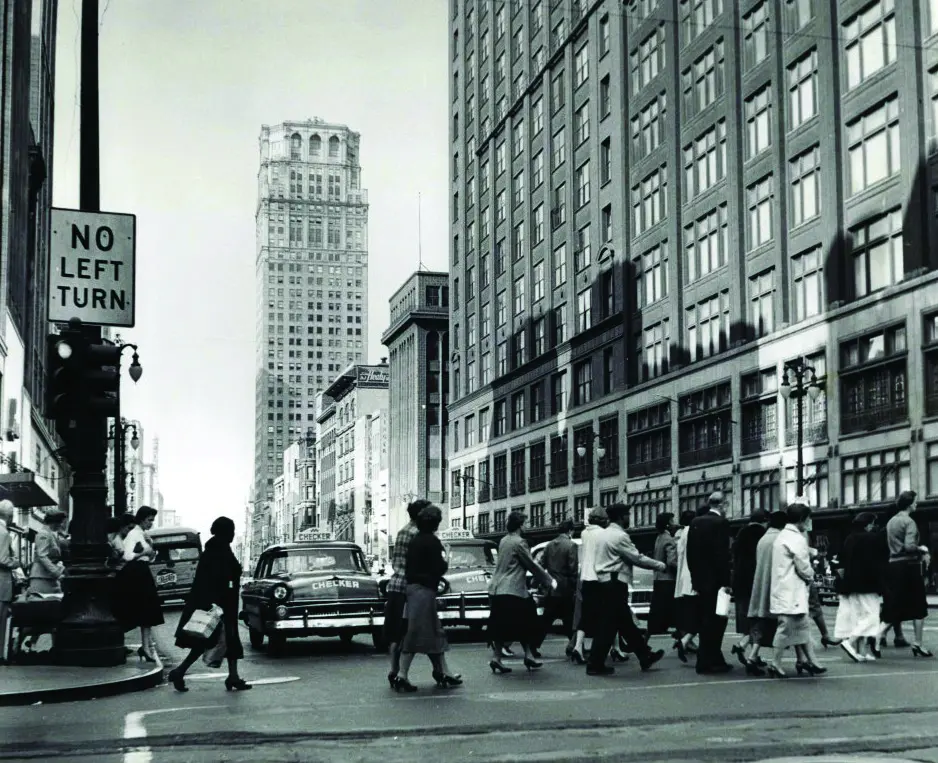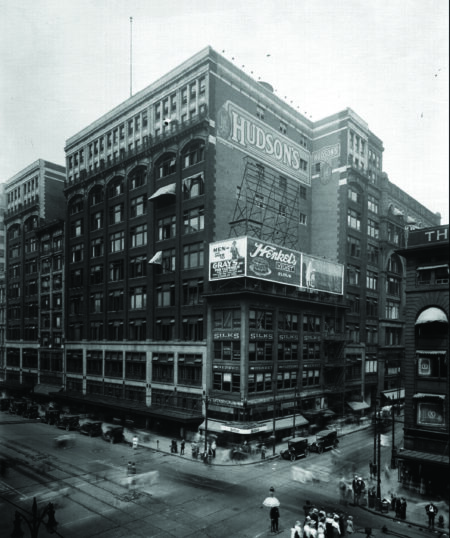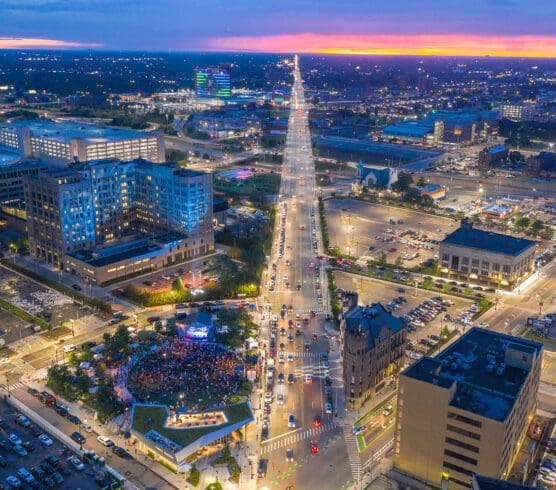Retail, J.L. Hudson’s Co., and How One Block Can Impact a Downtown
The J.L. Hudson company was a founding member of the Business Property Association in 1922, the first of several organizational iterations that today we know as the Downtown Detroit Partnership.
In the early 1900s, the J.L. Hudson company was THE place to shop. Thousands of Detroiters still share memories of visiting the store at Christmas or dining in one of the store’s many dining rooms and cafeterias that served an average of 10,000 meals a day – not counting the 6,000 meals a day served in the employee cafeteria on the 14th floor. By 1954, Detroit was at the height of retail nationally, but Hudson’s was not the only game in town. At the same time, Kern’s, Kresge’s and others made their mark Downtown. The same year, Hudson’s opened its first suburban store in Northland Mall.
Christmas was particularly special at the Downtown Detroit Hudson’s. Surprises awaited children of all ages throughout the store, including Santaland on the 12th floor. Hudson’s was one of the first stores to offer the public a choice between a Caucasian, African American, or Hispanic Santa – an idea way ahead of its time.
However, Hudson’s flagship store closed its doors in the following decades. In 1998, the building was imploded, and the remnants are a memory of Detroit’s “good old days.”
The Downtown Detroit Partnership continued to work to support the city’s small business community. Declining population, racial tensions, and city bureaucracy hampered growth. However, the DDP consistently looked for creative ways to build the city’s retail and restaurant community, including tax incentives, business improvement zones and creating popular events like Grillin’ and Groovin’, Downtown Detroit Days and the popular Ethnic Festivals. This all collectively helped bring investment, life and celebration to the streets of Detroit.
Fast forward to September 1999, Detroit mayor Dennis Archer tasked the Detroit 300 Conservancy, now a DDP affiliate, to create the “best public space in the world”. With the Conservancy’s leadership and funding, the newly designed Park space opened in 2004. In 2010, Campus Martius Park was chosen as the first winner of the prestigious Urban Land Institute’s Urban Open Space Award for “exemplifying the social and economic transformative effect of great public centers of activity, respite, and social interaction.” DDP continues to manage and program the Park as part of a growing network of downtown public spaces.
Just two years later in 2001, tech entrepreneur Peter Karmanos, then president and CEO of Compuware, had a vision many did not — he would build a premier office space to house its headquarters. Detroit’s modern transformation began with the Compuware Building, now One Campus Martius, when it opened in 2003. Its presence jump-started the economic reinvestment in Detroit’s Downtown core. For two decades, the glass atrium and 14-story water sculpture have evoked an urban living room, attracting locals and visitors to gather, socialize and pose for photos. (Source: Rosetti).
While many developments can be added to the list of credits that significantly changed Detroit, there is little question that this should be on the list. The impressive structure moved thousands of employees from the suburbs to the city. Likewise, in 2014, Dan Gilbert’s purchase of the building was another catalyst for Downtown Detroit’s revival. Mr. Gilbert, the co-founder of Quicken Loans, founder of Rock Ventures and more, went on to purchase the site of the Hudson’s building (along with dozens of other properties) and will complete the final re-invention of the site in 2024. His investments, philanthropy and commitment to the city have reinvented many areas of the Downtown.
Any discussion of Detroit’s revival needs to include Mike and Marian Ilitch, founders of the iconic Little Caesar’s Pizza chain. In 1987, the family purchased the Fox Theatre, investing $50 million to bring it back to its original opulence, and in 1989 purchased the adjacent office building for its headquarters. The Ilitch investments in the city would not stop there.
All these entrepreneurs are catalysts for driving Detroit’s retail, restaurant and entertainment growth in Detroit.




